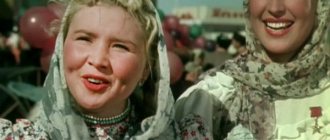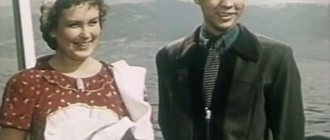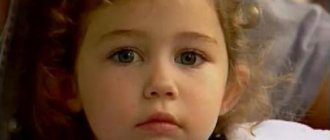Biography
The biography of the great Soviet actress Zoya Fedorova is similar to a film drama. It had everything: success and fame, great love and a romantic relationship with a foreigner, the happiness of motherhood, arrest, torture in prison and death at the hands of a cold-blooded killer.
Zoya Fedorova was born in pre-revolutionary Russia, in St. Petersburg, in 1909, on December 21. Her father Alexey Fedorov was a factory worker. Mother Ekaterina Fedorova was raising three daughters and a son. The family lived in a large apartment and did not know the need.
Zoya Fedorova in her youth
After the events of 1917, great changes took place in the life of the Fedorovs. Zoya's father wholeheartedly accepts the revolution and actively participates in it, making a rapid career in the Bolshevik Party. In 1918, the family ended up in Moscow. In the capital, my father is appointed head of the passport service in the Kremlin.
From early childhood, Zoya attended a drama club and dreamed of becoming an actress. The father did not like his daughter's hobby. After school at the age of 17, Zoya went to work at Gosstrakh. The service did not bring the slightest satisfaction; the girl’s artistic nature rebelled and found joy in the dances that she attended after work.
The childhood years of the future actress
Zoya Alekseevna Fedorova was born in pre-revolutionary Petrograd on December 21, 1909 in a working class family. Father Alexey worked at factories, and mother Ekaterina looked after her children: a son and three daughters, of whom Zoya was the youngest. In general, the family did not live in poverty and, by the standards of that time, was of average income.
The October events of 1917 greatly influenced the Fedorov family. His father, inspired by the ideas of the revolution, became an active participant in it, which helped him become quite a successful Bolshevik party leader.
Since Alexey received the position of head of the Moscow passport service, already in 1918 the Fedorovs moved to Moscow.
While studying in high school, the girl was very interested in theater arts and attended the corresponding club after school. Fedorova attended classes in the drama club until she graduated from school.
Since her dad was a completely conservative person and he didn’t really like his daughter’s hobbies, after graduating from school the girl gets a job at Gosstrakh. Monotonous and monotonous work was not at all to her liking and she often attended dances and other cultural events.
Espionage charge
At the party, Zoya meets a military man named Kirill Prove. Tender feelings flare up between the young people. In the fall of 1927, her lover was suddenly arrested as an English spy. Following him, Fedorova is taken into custody. She is suspected of aiding a foreign spy.
Zoya Fedorova in her youth
In November of the same year, the case was closed due to insufficient evidence to support the accusation. The situation was quite atypical for those times. Either providence stood up for Zoya, or the OGPU had some plans for her. Be that as it may, the creative biography of Zoya Fedorova might not have happened.
Foxtrot with Berry
Fedorova Zoya Alekseevna was born in St. Petersburg. Her father was an ordinary worker, but made a brilliant career, and therefore was transferred to Moscow. In the capital, for several years he held a very honorable position: he headed the passport office in the Kremlin.
Zoya Fedorova, whose biography began in a standard Soviet family, dreamed of being on stage since childhood. The father had nothing to do with art and reacted very categorically to his daughter’s desire to enter a theater university. He forbade her to even think about becoming an artist.
After graduating from school, Zoya Fedorova went to work as a counter at Gosstrakh. But secretly she continued to dream of cinema. The work of a counter for a girl of an adventurous nature, and this is exactly what the heroine of today’s story was, turned out to be quite boring. She spent her free time quite actively. She loved to attend parties and loved the foxtrot. This seductive dance once almost brought her to prison.
My first acquaintance with state security officers occurred in my youth. One day, a criminal case was opened against the frivolous accountant Fedorov. But she was soon released. It is noteworthy that the document lifting the travel ban was signed by Genrikh Yagoda himself. That is, the head of state security personally oversaw the arrest of an ordinary Moscow girl.
Years will pass. Yagoda will be arrested and shot. This will happen in 1938. Fedorova will bask in the glory at that time. And one day he will utter a strange phrase: “I once danced the foxtrot with Yagoda himself.”
Carier start
Despite her father's protests, in 1930 the girl entered the school at the Theater of the Revolution. While studying, she gets a cameo role in the film “Oncoming”. Relatives came to the premiere of the film, but Fedorova did not appear on the screen. The episode with her was cut during editing. On the set, Zoya meets cameraman Vladimir Rapport, whom she will marry.
Zoya Fedorova in the film “Wedding in Malinovka” | Cinema
Her first screen debut would be her role in the musical film “Accordion,” released in 1933. After the release of the film, the talented actress receives many offers from directors. One after another, pictures with her participation come out. The film “Girlfriends,” released in 1936, brought her enormous success and all-Union fame. The actress is in demand, famous, life is wonderful, but a difficult period begins due to the arrest of her father.
Zoya Fedorova in the film “Girlfriends” | Cinema
A Kremlin worker who personally knew Lenin became a victim of slander. The reason for the arrest could also be his free statements addressed to the country's leadership. His detention and imprisonment for 10 years came like a bolt from the blue. To help her father, Zoya made an appointment with Lavrenty Beria. Having a weakness for beautiful actresses, he invites her to the mansion. The father was released in the summer of 1941, and Zoya received the right to turn to Beria for help at any time.
Zoya Fedorova in her youth
After her father’s arrest, Zoya is assigned the status of the daughter of an “enemy of the people.” Surprisingly, this does not affect the fate of the actress; Fedorova continues to be filmed. Over the ten years of her career, 22 films with her participation have been made. She starred in most of them. For the films “Musical History” (1940) and “Frontline Girlfriends” (1941), the actress received the highest award at that time - the Stalin Prize.
Love story
Actress Zoya Fedorova is beloved and popular. The biography of this woman is a series of ups and downs. Even today she continues to fascinate, amaze, and makes her deeply sympathize with her.
In 1942, in the fall, the actress visited an exhibition of American cinema in Moscow. Here she meets Henry Shapiro. It was he who introduced her to her circle of friends, among whom was Jackson Tate. At that time he was deputy head of the naval section of the American military mission. The day after they met, Tate invited the actress to a restaurant. This is where their wonderful story of acquaintance began. Over time, it grew into love.
This story gave rise to many different rumors. Some sources claim that, being an MGB agent, the woman was specially introduced into the society of American diplomats. However, we should not forget that Zoya was an ordinary woman who fell in love with the handsome captain. After all, their acquaintance led to Fedorova’s pregnancy. In 1946, Fedorova had a daughter, Victoria. But, unfortunately, the father did not witness this joyful event.
Politics interfered with their relationship. After the end of the war, former American allies became enemies of the Soviet Union. Therefore, an amazing and wonderful romance could not end happily. In 1945, the actress was sent to Crimea on tour. And Jackson Tate receives orders from the Soviet authorities to leave the country within 48 hours. Returning from the tour, Zoya no longer finds her beloved.
Jackson Tate receives assignment to California. He knows nothing about the fate of the woman he loves. And she doesn’t even suspect that Zoya gave birth to a child. He sends letters and requests to the USSR every month. Naturally, he does not receive answers to them. And when Jackson had already despaired of receiving any news, he received a short anonymous letter. It reports that Fedorova successfully married a composer and is raising two children.
The lovers will be able to meet only in 1976, when Zoya is allowed to travel abroad.
Arrest
Zoya Fedorova is one of the most popular actresses of Soviet cinema. She is admired, loved, films with her participation are successful. But by the end of 1946, clouds were gathering over her head, and in December the actress was arrested. She is accused of waging hostile propaganda, creating an anti-Soviet group, making malicious attacks against the Soviet government, and even being ready to carry out terrorist acts against the leadership.
Zoya Fedorova in her youth
The actress turns to Beria for help, but she cannot avoid monstrous charges and a heavy sentence. Zoya Fedorova is sentenced to 25 years in a reinforced camp regime. All her property is confiscated, and her family is sent into exile. The little daughter ends up with relatives in Kazakhstan, in the village of Poludino.
In 1955, Zoya Fedorova was rehabilitated, and after a while the charges were completely dropped. She reunites with her 9-year-old daughter, returns to film and acts a lot. She gets small, but characteristic and memorable roles in films.
Biography[ | ]
Early years[ | ]
Born on December 21, 1907[2] in St. Petersburg, in the family of a worker and a housewife.
In 1918, the family moved to Moscow, where her father was offered a job as head of the Kremlin's passport service. Even during her school years, she studied in a drama club and dreamed of becoming an actress, but at the insistence of her parents, after graduating from school, she went to work as a bookkeeper at Gosstrakh.
In 1928, she entered the theater school, which was directed by Yuri Zavadsky, and after its closure, she continued her studies at the school at the Moscow Theater of the Revolution, which she graduated in 1934. During her student years, her husband was L. S. Weizler (1906-1966), later a famous theater actor who worked at the Taganka Drama and Comedy Theater until the end of his life. In 1934, she married cameraman V. A. Rappoport, whose marriage lasted until 1939. After breaking up with Rappoport, she met with pilot Ivan Kleshchev, who died at the front in 1942[4].
Film career[ | ]
As a student, she starred in the film “Oncoming” (1932), but her role was not included in the final version of the film. Therefore, the official film debut of the actress is considered to be the film “Accordion” (1934).
Zoya Fedorova during a break in a concert with Red Army soldiers, 1943
All-Union popularity came to her in 1936 after playing one of the main roles in the film “Girlfriends.” Even her father’s arrest in 1938 on trumped-up charges could not harm the actress’s brilliant career: she continued to play leading roles in films.
Disgrace and arrest[ | ]
In 1945, she met American diplomat Jackson Tate, with whom she gave birth to a daughter, Victoria, on January 18, 1946 (Tate had already left the USSR at the request of the Soviet government, not knowing about Fedorova’s pregnancy[5]). Trying to hide the fact of the birth of a child from a foreigner, the actress hastily married composer Alexander Ryazanov, with whose orchestra she performed in the early 1940s.
Jackson Tate and Zoya Fedorova
However, on December 27, 1946, Zoya Fedorova was arrested and, after preliminary detention in Lubyanka and Lefortovo prison, sentenced for “espionage” to 25 years in high-security camps (replaced by imprisonment in Vladimir prison), confiscation of property and exile for the whole family [ source not specified 188 days
].
Her sister Alexandra was sentenced to lifelong exile with her children [ source not specified 188 days
]; sister Maria - to 10 years of forced labor camps with time served at a brick factory in Vorkuta (died before the end of her sentence in 1952). Since 1947, her daughter Victoria Fedorova lived in exile in the village of Poludino in northern Kazakhstan with her aunt Alexandra and her children Nina and Yura.
Liberation[ | ]
She was released in 1955. On February 23, 1955, she was reunited with her daughter Victoria and soon returned to films. In the 1960s and 1970s, she continued to act a lot, mostly in small character roles.
In 1976, the actress was allowed to visit the United States, where she again met Jackson Tate. After Tate’s death in 1978, she came to the United States twice more to visit her daughter (who emigrated in 1975), and then began collecting documents to go there for permanent residence, which was prevented by her murder.
Murder[ | ]
On December 11, 1981, after 14:00, the actress was shot in the back of the head from a German Sauer pistol in her three-room apartment No. 243, building 4/2 on Kutuzovsky Prospekt. The murder is still unsolved; the investigation looked into her possible involvement in the so-called “diamond mafia”, but no such facts were revealed; according to another version, this murder was organized by the KGB[6]. During her lifetime, the actress herself often said: “If something happens to me, know that all this is the work of the KGB!” Based on the murder, Yulian Semyonov wrote the novel “The Secret of Kutuzovsky Prospekt.”
The actress was buried on December 17, 1981 in Moscow at the Vagankovskoye cemetery[7].
Personal life
Her first husband was reporter Vladimir Rappoport; in the late 30s, their marriage began to crack. The second husband, pilot Ivan Kleshchev, is taken away by the war. At the same time, another Ivan, her brother, dies.
Jackson Tate
The actress's third love for an American military man brought the happiness of motherhood and other events that changed her life. In the fall of 1942, at an exhibition of American cinema in Moscow, the actress met United Press correspondent Henry Shapiro, among whose friends was Jackson Tate. He was deputy head of the naval section of the American military mission. Tate invites the actress to a restaurant. Thus began a beautiful love story between a Soviet actress and an American military man.
There were different rumors about her. According to some sources, the actress, who was a KGB agent, was specially introduced into the society of American diplomats. Be that as it may, Zoya fell in love, became pregnant and gave birth to a daughter, whom the handsome captain found out about many years later. At the end of the war, former allies became enemies, so the relationship between Fedorova and Tate could not have a happy ending.
Zoya Fedorova with her daughter, son-in-law and grandson | Wday
In July 1945, Zoya was unexpectedly sent on tour to Crimea, and Tate was expelled from the USSR within forty-eight hours. After returning to Moscow, Zoya did not find her beloved. He writes letters and sends requests, but to no avail. When there was no longer any hope, an anonymous letter arrived in his name, informing him that Fedorova was married to a certain composer and they had two children.
Zoya Fedorova with her daughter | Colors.life
There was some truth in this message. In 1946, the actress had a daughter. At the same time, a decree was issued to punish single mothers. To protect Zoya from further troubles, composer Alexander Ryazanov, who had known her since the 40s, offered to sign her name. She met Jackson Tate in 1976, when she was allowed to travel abroad.
Zoya Fedorova
Daughter Victoria inherited her mother's talent and became an actress. In her youth, when she lived in Moscow, her friends and filming partners were Oleg Yankovsky, Valentin Smirnitsky and Boris Khmelnitsky. Then she went to America, where she also acted. At the age of 66 she passed away due to an incurable disease.
Fedorova Zoya Alekseevna
|
Actresses
Honored Artist of the RSFSR (1965) State Prize Laureate (1941, for the performance of the role of Klava in the film “Musical History”) State Prize Laureate (1942, for the performance of the role of Natasha in the film “Frontline Girlfriends”) Knight of the Order of the Red Banner of Labor (1939, for the performance the role of Varvara Korneevna Vlasova in the film “On the Border”)
Zoya Fedorova was born in St. Petersburg on December 21, 1909. Her father, Alexey Fedorov, was a highly skilled metal worker, and her mother Ekaterina Fedorova did not work, took care of the house and raised three daughters, the youngest of whom was Zoya. The Fedorov family lived in a three-room apartment and did not need anything. After the revolutionary events of 1917, in which Alexey Fedorov took an active part, he managed to make a career in the party in a short time. For his loyalty to the ideas and cause of the revolution, he received a high post in the Kremlin from Lenin himself, and in 1918 he moved to Moscow, where he headed the Kremlin passport office. In Moscow, the Fedorov family received a six-room apartment with full furnishings from the former owners, but the father took out the furniture and other things and donated them to the museum. For some time, the Fedorov family slept and ate on the floor, and Alexey Fedorov soon allowed strangers to live in two of the six rooms. Zoya Fedorova became interested in the stage during her school years, she attended a children's theater group, but her father decided that her daughter should have a serious profession, and under his patronage, after graduating from school, Zoya got a job at Gosstrakh as a bookkeeper. At the age of eighteen, Fedorova found herself in a story that could have ruined her life and the career of her father. At youth evenings hosted by a certain Kebren at his home, Zoya met the young military man Kirill Prove. He was handsome, played the piano beautifully, was courteous, and quickly charmed young Fedorova, and a romance began between the young people. But in the fall of 1927, Prove was arrested by the GPU on suspicion of state espionage and working for British intelligence. Next, Fedorova was arrested and accused of aiding a foreign spy. Zoya said during interrogation: “In 1926–1927, I attended evenings with a man named Kebren, where I danced the foxtrot. It was with him that I met soldier Prove Kirill Fedorovich. He played the piano there. Kirill was at my house once, for about ten minutes, no more. I don’t remember what they talked about, but, in any case, it wasn’t about business. He didn’t ask me for any information, and I never gave it to him. He also never said anything about his foreign acquaintances. There were no foreigners with me at Kebren, and I have no foreign acquaintances.” After familiarizing themselves with the circumstances of the case, the security officers released her. The investigator wrote a resolution: “Having considered case No. 47268 on charges against Z.A. Fedorova. of espionage, and taking into account that the charge against her has not been proven, and the latter’s remaining at large will not interfere with the further progress of the investigation, he decided: a preventive measure against the arrested Fedorova Z.A. change by releasing her from custody on her own recognizance not to leave Moscow.”
Zoya Fedorova continued to dream of becoming an actress, and in 1928 she entered the theater school, which was led by Konstantin Stanislavsky’s student Yuri Zavadsky. Two years later, the school closed, the students were dismissed, and Fedorova was going to return to work at Gosstrakh, but at the end of 1930 she was able to continue her studies. She entered the first year at the school at the Theater of the Revolution. In 1932, she was invited to star in a short episode of the film “Oncoming” by Sergei Yutkevich in the role of Chutochkin’s wife. When the film was released, Zoya gathered the whole family for the premiere, but it turned out that the episode with her participation was cut out during the final editing. During filming, Fedorova met cameraman Vladimir Rapoport, and in 1934, after graduating from college, she married him. In 1933, the director of the musical film “Garmon”, Igor Savchenko, drew attention to Fedorova. Having met Zoya backstage at the Theater of the Revolution, he offered her a role in his film. She was surprised: “I’m snub-nosed.” “It’s precisely because of this that I’m taking you,” Savchenko replied. In the film “Accordion” Fedorova played the mischievous, cheerful and perky village girl Marusenka. Her film debut immediately brought Zoya Fedorova fame, directors became interested in her, and soon films with her participation began to appear on screens one after another.
In the film "Harmon".
In 1936, the film of the Leningrad film studio “Girlfriends” directed by L. Arnshtam was released on the screens of the USSR. It was a story about three young girls who voluntarily went to the front as sisters of mercy during the Civil War. Zoya Fedorova, Irina Zarubina and Yanina Zheimo played the main roles in the film. The film was a great success; this work brought Fedorova all-Union fame and the love of numerous fans. They called her at home, did not allow her to walk quietly down the street, and fans bombarded her with letters. Her husband, Vladimir Rapoport, lived in Leningrad, she lived in Moscow, and he was not happy with the separation from his young wife. By the end of the year, he managed to get a separate apartment for himself and Fedorova, but she was in no hurry to move and continued to actively pursue her career. In 1937, Rapoport and Fedorova took part together in the work on the film “On the Border”. This picture was not as successful as the previous film with Fedorova, but her role in this film did not go unnoticed. The audience continued to love Fedorova, and critics were favorable to her.
In the movie "Girlfriends".
At the very beginning of her takeoff, her career almost ended. In 1936, Zoya's mother fell ill, and doctors discovered cancer in her. Alexey Fedorov found a private oncologist for his wife, a German named Beck, whose intervention did not help save the patient, but the presence of a foreigner in the house of a party leader was interpreted not in Fedorov’s favor. When the campaign against “enemies of the people” began in the USSR, Alexey Fedorov was arrested under Article 58 of the Criminal Code for alleged connections with foreign spies, as well as for harsh open criticism of some high-ranking leaders. In the summer of 1938 he was sentenced to ten years in prison. Having become the daughter of an “enemy of the people,” Fedorova expected her career as an actress to end, but her father’s arrest at that time had virtually no effect on her future creative destiny. Over the course of ten years, Zoya Fedorova starred in 22 films, in most of them she played leading roles. For the films “Musical History” in 1940 and “Frontline Girlfriends” in 1941, Zoya Fedorova received the Stalin Prize, but she did not like that all the roles of positive Soviet heroines were similar to each other. The actress played in the films “Miners” in 1937, “Man with a Gun” in 1938, “Dalnyaya Stanitsa” in 1939 and many other films.
In the film "Miners".
One of Fedorova’s most notable works was the role of Nadezhda Kolesnikova in the film “The Great Citizen.” Fedorova succeeded in something that many other actresses could not do - in ideological stories, she reduced the pathos of her heroines, made them living, naive, real women, but the actress herself later admitted that she dreamed of completely different roles, even tried to change her image and play negative heroine.
In the movie "Man with a Gun".
A significant place in Fedorova’s work was occupied by work in comedy films. She brilliantly played the role of the Bride, a provincial cutesy young lady, in the film adaptation of Chekhov's “The Wedding” in 1944. At the end of the 1930s, her marriage to Vladimir Rapoport finally broke up. In 1939, the actress met the pilot Ivan Kleshchev, a relationship began between them, but they did not have time to get married. The war began, Kleshchev went to the front, was shot down in one of the battles near Stalingrad, but survived. He spent more than a month with serious injuries in the hospital, from where he was discharged with the conclusion “unfit to fly.” Hero of the Soviet Union Ivan Kleshchev was assigned to the air crash investigation department. Fedorova began to prepare for the wedding, but one day, when Kleshchev flew on a service plane to the crash site, the plane was attacked by enemy aircraft, was shot down and crashed. Meanwhile, Zoya Fedorova did not stop trying to get her father out of prison. As a result of her efforts, 56-year-old Alexei Fedorov was released in August 1941, but he was very ill; during his imprisonment in the camp, his fingers on both hands were amputated due to frostbite. On September 22, 1941, Zoya Fedorova’s father died, and in the fall of the same year, her younger brother Ivan died at the front.
With soldiers at the front.
At the same time, Zoya Fedorova became the object of the persistent courtship of Lavrentiy Beria, who, according to rumors, helped rescue her father from the camps. In December 1943, he invited the actress to visit his house on Kachalova Street, explaining his invitation: “My wife loves you and wants to celebrate your birthday in a narrow circle.” Fedorova could not refuse the People's Commissar. When she arrived at the party, it turned out that Beria’s wife was not at home, and no celebration was planned. Having flared up, the actress insulted Beria, he kicked her out of the house, handing her a bouquet of roses with the words: “These are flowers for your grave!” After such a warning, Fedorova expected arrest, but it did not follow. She continued to act a lot, led an active social life, attended exhibitions and receptions at foreign embassies. In the fall of 1942, at an exhibition of American cinema in Moscow, the actress met Henry Shapiro, a correspondent for the American newspaper United Press. In January 1945, at a gala reception in a mansion on Spiridonovka, he introduced her to his friends, among whom was Jackson Tate, deputy head of the naval section of the American military mission, and later a rear admiral. The next day, Tate invited Fedorova to the Moscow restaurant. Their communication quickly grew into love. The couple did not hide their relationship; they went to theaters and restaurants, to dances and receptions. This relationship gave rise to a lot of rumors; the actress was suspected of either being an agent for foreign intelligence, or working for the MGB, or being a double agent.
After the end of the war, the Americans turned from allies into enemies, and the actress’s relationship with the American diplomat ended in a series of problems and troubles. In July 1945, she was unexpectedly sent on tour to Crimea, and when she returned to Moscow, she no longer found Tate there. He received an order from the Soviet authorities to leave the USSR within two days. In America, Jackson Tate was assigned to a naval base in California, and on January 18, 1946, Fedorova gave birth to a daughter, Victoria, from Jackson Tate. Tate knew nothing about the fate of his lover or the existence of his daughter. Trying to restore contact, he regularly sent persistent requests and letters to the USSR, but received no response. Later, an unsigned letter from Sweden arrived in his name, informing him that Zoya Fedorova had married a famous Soviet composer, was raising two children and was happily married. Back in the early 1940s, Zoya Fedorova met and became friends with composer Alexander Ryazanov, and became a vocalist in his jazz quartet. When a decree was issued to punish single mothers, he invited her to sign. Fedorova initially refused him, but then agreed. But this could no longer save her. Since August 1946, the actress was under constant surveillance. On December 27, 1946, Fedorova spent the evening at the house of an English journalist and his wife, after which she was arrested in her apartment. The warrant said: “I, the assistant head of the department, Captain Raskatov, having examined the materials regarding the criminal activities of Zoya Alekseevna Fedorova, found: with the materials available in the USSR Ministry of State Security, Z.A. Fedorova. exposed as a foreign intelligence agent. In addition, it has been established that Fedorova is a member of a group of Anglo-American orientation that is in the position of actively fighting the Soviet regime. Decided: Z. A. Fedorova should be arrested and searched.” The actress spent more than six months in the Lubyanka in an internal prison, where she was interrogated and tortured, she was not fed, she was doused with boiling water, and she was not allowed to sleep. They interrogated everyone who was close to the actress - sisters, friends and husband. Alexander Ryazanov testified under pressure: “At the end of July 1945, Fedorova secretly told me that she was pregnant by Captain Jackson Tate. We agreed: I will be considered the father of the child. I did this because I also wanted to go to America and hoped to implement this plan with the help of Fedorova.” On August 15, 1947, Zoya Fedorova and six other prisoners were sentenced to 25 years in prison with confiscation of property for spying for foreign states. The main points of the accusation looked very frightening: “She was the initiator of the creation of an anti-Soviet group, conducted hostile propaganda, made malicious attacks against the leaders of the All-Union Communist Party (Bolsheviks) and the Soviet government, called on her accomplices to fight for the overthrow of the Soviet government, expressed personal readiness to commit a terrorist act against the head of the Soviet states. She maintained criminal connections with foreign intelligence officers located in Moscow, to whom she conveyed distorted information about the situation in the Soviet Union. She was planning to escape from the USSR to America. In addition, she illegally kept weapons in her possession.” One of Fedorova’s sisters, Alexandra, along with her children was sent into exile in Kazakhstan, the second, Maria, was sentenced to forced labor camps. After the verdict was announced, the actress tried to hang herself in the isolation cell, but the guards did not allow her to do this. On December 20, 1947, from a camp in Potma, she wrote a letter full of despair to Lavrenty Beria: “Dear Lavrenty Pavlovich! I turn to you for help, save me. I cannot understand why I am being tormented so cruelly. In January 1941, having visited you several times on personal matters, I remembered your words well. You allowed me to turn to you for help in difficult moments of life. And now the difficult moments have come for me. Even more than severe, I would say – deadly. In deep despair, I turn to you for help and justice. On December 27, 1946, I was arrested. I was extremely surprised by this arrest, since I did not know of any crimes... The crime I was charged with and the entire course of the investigation resembles some kind of bloody comedy, built by the investigators on several phrases I carelessly said, as a result of which they made a monster out of me on paper. I tried to object and asked: “Why are you exaggerating everything and answering for me yourself?” And they told me that if my answers were written down, the protocols would be illiterate. “You are afraid of terms,” they told me and inserted terms into my answers - one more terrible than the other, one more shameful than the other, making me a monster and a traitor to the Motherland... The investigators told me: “Don’t be afraid, these protocols will be read by smart people who will understand everything Right. Don't you feel like they want to give you a helping hand? You needed to be shaken up. And in general, this case is unlikely to go to trial.” I went crazy, decided to commit suicide and hanged myself in solitary confinement in the Lefortovo prison, but they didn’t let me die... Then I was sent to the Temnikov camps - sick, half-crazy. But such a severe punishment seemed insufficient to the Special Meeting, and two months later they decided to add confiscation of property, to take away what had been acquired throughout a lifetime of honest labor. By this they punished not me, but my little children, of whom I had four dependents: the youngest, my daughter, was two years old, and the oldest, my nephew, was ten years old. I beg you, dear Lavrenty Pavlovich, save me! I feel guilty for my frivolous nature and intemperate language. I well understood my mistakes and appeal to you as to my own father. Bring me back to life! Take me back to Moscow! Why should I die? My only hope is your fair decision.” Appealing to Beria did not help, Fedorova was not released. At first she was in a Chelyabinsk prison, then she was transferred to a closed prison in Vladimir, where the singer Lidia Ruslanova became her cellmate. In a small note from Kazakhstan from the actress’s sister, Alexandra Fedorova, Fedorova learned that she had taken little Vika into her care. After Stalin's death, Zoya Alekseevna spent another two years in prison and was released in February 1955. Returning to Moscow, she found herself without an apartment, work, money and connections. At first, Fedorova lived with Lydia Ruslanova. Sergei Mikhalkov also helped her, who once gave the actress two thousand rubles - an unthinkable amount at that time. In the spring of 1955, the long-awaited meeting between Fedorova and her daughter took place. Before this, Victoria considered Aunt Alexandra to be her mother, and the appearance of a real mother became a test for the whole family.
With daughter Vika.
1958 Gradually, Fedorova began to be invited to films, mainly for small character roles, and she was given an apartment on the Taras Shevchenko embankment. She began to appear at receptions again, albeit infrequently. Journalist Victoria Molodtsova recalled one such evening: “In the fifties, Zoya Fedorova, apparently, rarely went to visit. With her presence she honored only long-time acquaintances, loved ones and close friends. Or maybe not everyone simply invited her to visit: for a long time after Stalin’s death, people did not believe that the old days, when they could be put in prison for nothing, sent to a camp, shot for a trifle, for a joke, for an awkward, inappropriately spoken word, for mentioning the leader’s name in vain, they have already passed irrevocably. From that terrible and incomprehensible time, the habit remained in families of saying something important, tightly closing all the doors, in a half whisper or with the radio on. This time Zoya Alekseevna accepted the invitation of the widow of a rather famous general, whom she apparently knew during the war, and perhaps even before it. As a child, I did not understand with whom fate had brought me together under the same roof - the great singer Lydia Ruslanova with her husband General Kryukov, Rokossovsky’s wife, Air Marshal Savitsky, some tall, stately military men with many medal bars and stars of Heroes of the Soviet Union, and, finally, great actress, beauty Zoya Fedorova, whom everyone treated with emphatic respect and love. Then it was always difficult for me to imagine that the modest woman I had once seen so closely was the same one who plays roles in films. Zoya Alekseevna then brought with her a dark-haired girl, extremely constrained and awkward. I understood it very well: the company of adults who ask the same banal questions, feigned surprise at the genius or, on the contrary, the extreme modesty of children, did not add much joy to me. We were introduced. And I remember how surprised we were that we were the same age and had the same name – Victoria.” In 1955, Nadezhda Kosheverova invited Fedorova to play the role of a cook in her new film “Honeymoon”. The film was a success, and the actress began to regain her former popularity. The role of the actress changed - now she played aunts, mothers and grandmothers. She played one of her most striking roles in Ryazanov’s comedy “Girl Without an Address” in 1957. In this film, Fedorova played an elderly, stupid, impudent and absurd lady named Kusik. Fedorova’s partner in the film, actress Svetlana Karpinskaya, recalled: “I was afraid of Zoya Fedorova. At first she seemed very arrogant to me, even malicious. After filming, she and I were driven home in the same car. She was silent the whole way, obviously not taking me seriously. During the course of the film, Katerina was hit by Fedorov’s car. I had to do a lot of takes, I actually fell, and then walked around with bruises for a long time. I was surprised that Zoya Fedorova, who was driving, never came up afterwards and expressed sympathy. To be honest, I was offended at Zoya in my heart until I quite accidentally learned from the make-up artist how much the famous actress had to endure: it turns out that she served eight years in the camps. I remember an incident when someone from the group raised their voice at her, and Zoya barked in response: “They’ve been shouting at me for eight years, don’t you dare!” It seemed as if the famous actress was constantly defending herself from someone, even when no one was attacking her...”
In 1959, Zoya Fedorova decided to find out about the fate of Jackson Tate. With the help of a friend who worked at the Ukraina Hotel, the actress met an American of Russian origin, Irina Kirk. She agreed to help, but the search took a lot of time. When Tate was found, it turned out that he had had his own family for a long time, and he did not show any particular desire to restore contact with his Russian girlfriend. Kirk herself later said that Tate’s refusal to communicate with his daughter and former lover was forced and fabricated. Fedorova continued her career, and many films with her participation were released in the 1960s. The films became popular, and both directors and audiences loved the actress. She starred in the films “Grown Children” and “Scarlet Sails” in 1961, “Summer is Lost” and “The Tale of Lost Time” in 1964, “Operation Y” and Other Adventures of Shurik” in 1965 and “Wedding in Malinovka "in 1967.
In the film "Wedding in Malinovka".
In 1965, Zoya Fedorova was awarded the honorary title of Honored Artist of the RSFSR, and in 1966, her portrait was featured in the second issue of the collection “Actors of Soviet Cinema.”
In the film “Operation “Y” and other adventures of Shurik.”
In the 1960s, Victoria Fedorova, who had graduated from VGIK by that time, also began acting in films. In 1961, Zoya Alekseevna told her daughter the truth about her father. While still a student, Victoria met the son of a famous Georgian director, who studied at VGIK. In January 1967, the young people got married, although Zoya Alekseevna was strongly opposed to this marriage. The young family lived in the same apartment with Fedorova, and their life together was accompanied by constant quarrels and conflicts. Victoria's husband turned out to be very jealous, tried to commit suicide several times based on suspicions of his wife's infidelity, cut his wrists, and tried to jump out of the window. It was clear that it would not be possible to save the family, and in 1969 Fedorova’s daughter filed for divorce. Soon she married a second time to the son of her mother’s friend, but this marriage also turned out to be unhappy and broke up in 1972. For the third time, Victoria Fedotova married film screenwriter Valentin Yezhov, who was twice her age and suffered from alcohol addiction. After some time, Victoria also started drinking. Zoya Fedorova fought her son-in-law as best she could; in 1973, she called the police and the secretary of the party organization home. The screenwriter was caught in antisocial behavior, which was followed by his breakup with Victoria.
Zoya Fedorova with her daughter.
In the fall of 1973, Victoria and Zoya Alekseevna were on the set of the film “Anger” in Moldova, and there they received a letter from Jackson Tate. He asked for forgiveness and wanted to meet his daughter. Victoria responded to her father’s request and tried to leave for the United States for almost two years. She was released from the country only after an article was published in the New York Times on January 27, 1975 about the tragic love story of an American military man and a Soviet actress. The article caused a great resonance, Hollywood offered to buy the rights to this story and make a film. Because of the uproar, the Soviet authorities had to issue Victoria Fedorova a visa. In the spring of 1975, Jackson Tate met his daughter. Soon she married the pilot Frederic Puy and remained forever in America.
Zoya Fedorova with her daughter and grandson.
Zoya Fedorova continued acting after her daughter left. She played in the films Shadows Vanish at Noon in 1971, Dirk in 1973, The Car, the Violin and the Blob the Dog in 1975, and Live in Joy in 1978.
In the film "Girl Without an Address".
Fedorova was loved by directors; she was filmed by Eldar Ryazanov, Rolan Bykov and Vladimir Menshov. Her last film work was the role of watchman Aunt Pasha in the film “Moscow Doesn’t Believe in Tears” in 1979. In the 1970s, the actress received an apartment in a prestigious building on Kutuzovsky Prospekt. In April 1976, she managed to fly to the United States, where she met her daughter and Tate. After Tate’s death in 1978, Fedorova visited her daughter in America twice more, but each time she returned to the USSR, although she could have stayed with Victoria.
In 1980, Zoya Fedorova again wanted to visit her daughter, but they did not want to let her out for a long time, because Victoria published a book where she talked about the fate of her mother and the horrors of Soviet repressions. The visa was nevertheless obtained, but Fedorova was unable to leave. Victoria Fedorova recalled: “Mom called me, I told her what I heard from Bradley. “They can only help you if you apply for permanent emigration.” “I don’t want to,” I heard from my mother. “I’m Russian, I love Moscow.” I'm an actress. What about my viewers? No, I’ll go to the OVIR again.” And she went. This was on Wednesday. At the OVIR, as I now know, my mother said: “You yourself are pushing me to leave, but I don’t want that. I just want to see my grandson, my daughter.” On December 10, 1981, Zoya Fedorova was shot dead in her own apartment; her body was discovered by a neighbor and the actress’s nephew and his wife. The killer was never found, although the investigation lasted for more than four years. Various versions of the motives for the murder were put forward, political, criminal, domestic, and espionage, but none of them led to the criminal. Police Lieutenant General, Head of the Main Directorate of Criminal Investigation of the USSR V.K. Pankin said: “She was killed by a shot in the back of the head from a Sauer pistol.” The criminal had a key to the apartment. Then the story began to become overgrown with legends. In Moscow, I heard that Zoya had some secret information, so she was not allowed to leave. It is not true". Zoya Fedorova was buried at the Vagankovskoye cemetery in Moscow.
Victoria Fedorova, in collaboration with Geskel Frenkl, wrote a book about her mother, “The Admiral’s Daughter,” and planned to make a film based on it.
She said: “Mom deserved to at least have her story told truthfully. Otherwise, I don’t have the strength to read all these cheap journalistic investigations, books where the circumstances of my mother’s life and death are turned inside out, overgrown with utter speculation, stories about mythical diamonds... For me, the main thing is to make this story as it really was. And it was a beautiful love story with a tragic twist.” In 2003, a documentary film “Unfinished Tragedy” was shot about Zoya Fedorova. Your browser does not support the video/audio tag. The text was prepared by Anastasia Chechetka
Materials used: Materials from the site www.gazeta.aif.ru (text by Alexey Barinov) Materials from the site www.gramotey.com (text by Fedor Razzakov) Materials from the site www.rg.ru (text by Victoria Molodtsova) Materials from the site www.rtishcheva .ru (interview with Victoria Fedorova) Materials from the site www.clubs.ya.ru (text by Alevtina Letopistseva) Materials from the site www.peoples.ru (texts by Elda Lyngina, Boris Sopelnyak, Alexey Barinov) Materials from the site www.rg.ru (text by Victoria Molodtsova)
FILMOGRAPHY:
1932 - Oncoming - Chutochkin's wife (the role fell during editing) 1934 - Accordion - Marusenka 1935 - Pilots 1935 - Girlfriends 1936 - Marriage - Dunyasha 1937 - Miners 1937 - Big wings 1937 - On the border - Varvara Korneevna Vlasova, daughter of Stepanida 1937— 1939 - Great Citizen - Nadya Kolesnikova 1938 - Years of Fire 1938 - Man with a Gun - Katya Shadrina 1939 - Night in September 1939 - Dalnyaya Village - Daria Mikhailovna Gorkunova 1940 - Musical history - fleet manager Klava Belkina 1940 - Sixty days 1940 - On the tracks 1941 - Patriot 1941 - Front-line girlfriends - Natasha 1944 - Ivan Nikulin - Russian sailor 1944 - Wedding - bride Dasha 1956 - With my own hands 1956 - Honeymoon - cook, Lizaveta Fedorovna 1956 - Girl and crocodile - Nadezhda Fedotovna 1957 - Poet - Mother of the poet Tarasova 1 957 — Leningrad Symphony 1957 — Girl without an address — Komarinskaya 1957 — Night patrol — Marfa Potapovna, Nezhuk’s wife 1957 — Wrestler and clown — Odessa resident 1958 — “Motley” case — mother of Igor Peresvetov 1958 — Groom from the other world — chief physician 1958 — Friend — aunt Natasha 1959 - In our city 1959 - I am writing to you 1961 - The heart does not forgive - Domna Egorovna 1961 - Adult children - Koroleva 1961 - Scarlet Sails - governess 1962 - Sixteenth spring 1963 - Blind bird - a woman with a purse 1963 - Summer is gone - Aunt Dasha 1963 - Mommy and two drones - mommy 1963 - It happened in the police - secretary Ekaterina Ivanovna 1963 - Familiar address 1964 - Believe it or not... - Misha Sazonov's grandmother 1964 - The Tale of Lost Time - Cloakroom Keeper 1964 - Rockets should not take off - Frau Koestler 1965 - Foreigner - Evdokia Mikhailovna, cousin of the professor 1965 - Sleeping Lion 1965 - Operation "Y" and other adventures of Shurik - Lida's neighbor, Aunt Zoya 1965 - Cook 1965 - Green Light manager of the Bridal Salon 1965 - Bad anecdote - Pseldonimov's mother 1965 - Give me a complaint book - janitor Ekaterina Ivanovna 1965 - From seven to twelve 1966 - Rainbow formula - Aunt Shura 1967 - Wedding in Malinovka - Gorpina Dormidontovna 1968 - Smile at your neighbor 1970 - Between tall loaves - saleswoman Motrya 1970 - Attention, turtle! - singing teacher 1971 - Shelmenko the orderly - Fenna Stepanovna 1971 - Russian Field - Matryona Diveevna 1971 - Across the river - border 1971 - Shadows disappear at noon - Maria Dmitrievna 1971 - Hello, Warsaw! - hotel administrator 1972 - Here is my village 1973 - At my own request 1973 - Dirk - Misha's grandmother 1973 - A drop in the sea 1973 - Invisible hat - dubbing 1974 - Did you call the doctor? - Maria Iosifovna 1974 - Anger - lady 1974 - Incident 1975 - Car, violin and dog Blob - Maria Fedorovna 1978 - Live in joy 1979 - Moscow does not believe in tears - Aunt Pasha (watchwoman) 1980 - Morning round - Egorova
December 21, 1909 – December 10, 1981
Similar articles and materials:
Fedorova Victoria (Documentary films)
Fedorova Victoria Yakovlevna (Actresses) Fedorova Zoya (Documentary films) Fedorova Zoya (Series of programs “How the idols left”) Fedorova Zoya (Series of programs “My Silver Ball”) Fedorova Zoya (Series of programs “Legends of World Cinema” ) Fedorova Zoya (Series of programs “In Search of the Lost”) Fedorova Zoya (Series of programs “Motley Ribbon”)
| To comment you must register! |
Information
Visitors in the
Guests
cannot leave comments on this publication.
Death
In 1981, on December 11, the actress was found dead in her apartment. The cause of death was a shot to the head. It is unknown who shot Zoya Fedorova, the mystery of her death remains unsolved.
Zoya Fedorova in recent years | Kinodir
There were several versions. According to one of them, she was killed by a KGB agent, as she was going to leave for permanent residence in America, where her daughter had previously moved. According to another, she gave her life for diamonds, as she was part of the “diamond mafia”, the backbone of which were the children and wives of Kremlin figures, among them was Galina Brezhneva.
Murder of a Movie Star
Viewers remember Fedorov well from Menshov’s film “Moscow Doesn’t Believe in Tears.” The role of a dormitory watchwoman was one of her last films. In 1981, the actress was killed in her own apartment. This crime remains unsolved. There are several versions. Why and by whom was Zoya Fedorova killed? The biography, personal life and career of this actress include several contradictory facts.
In the nineties, Russian newspapers trumpeted the political murder of Fedorova. This version was completely in keeping with the spirit of the times. In order to understand how much truth there is in it, let us remember the biography of the Soviet film star.
Filmography
- "Moscow does not believe in tears"
- "Live in Joy"
- “Did you call the doctor?”
- "Car, violin and dog Blob"
- "At your own request"
- "Dirk"
- "Beyond the river - the border"
- "Operation Y and other adventures of Shurik"
- "Foreigner"
- "Believe it or not…"
- “Give me a book of complaints”
- "The Tale of Lost Time"
- "Scarlet Sails"
- "Wedding"
- "Miners"
- "Big wings"
- "Marriage"
- "Pilots"
- "Girlfriends"
Dangerous acquaintances
It would seem that what could be criminal in a foxtrot? However, at one of the evenings that Zoya Fedorova attended, a handsome pianist was present. The musician noticed the bright blonde, and subsequently visited her often. And only after the arrest, the actress learned that this man was none other than an English spy.
As for Yagoda, this man had a rather terrifying reputation. Surprisingly, the executioner, who was responsible for thousands of ruined lives, suddenly contributed to the release of Zoya Fedorova, who was previously unknown to him.
Mother and daughter
Not only Fedorova was arrested, but also her close relatives. One of the sisters was sent into exile. The woman took Victoria, the daughter of the actress, with her. The girl did not know who her birth mother was until she was nine years old.
Fedorova was granted amnesty. She was released in 1955. She was forty-five years old. There was no housing, no work. But soon the situation changed. The actress began acting in films again, and then got an apartment.
Zoya Fedorova and her daughter moved to one of the most prestigious areas of Moscow. The actress spent her last years in the apartment on Kutuzovsky.
In the sixties, Fedorova led a very active lifestyle. She starred in such films as “The Blind Bird”, “Scarlet Sails”, “Grown Up Children”, “The Tale of Lost Time”. According to the recollections of colleagues, she was an extremely sociable and open person. Therefore, the events of December 1981 shocked many.











